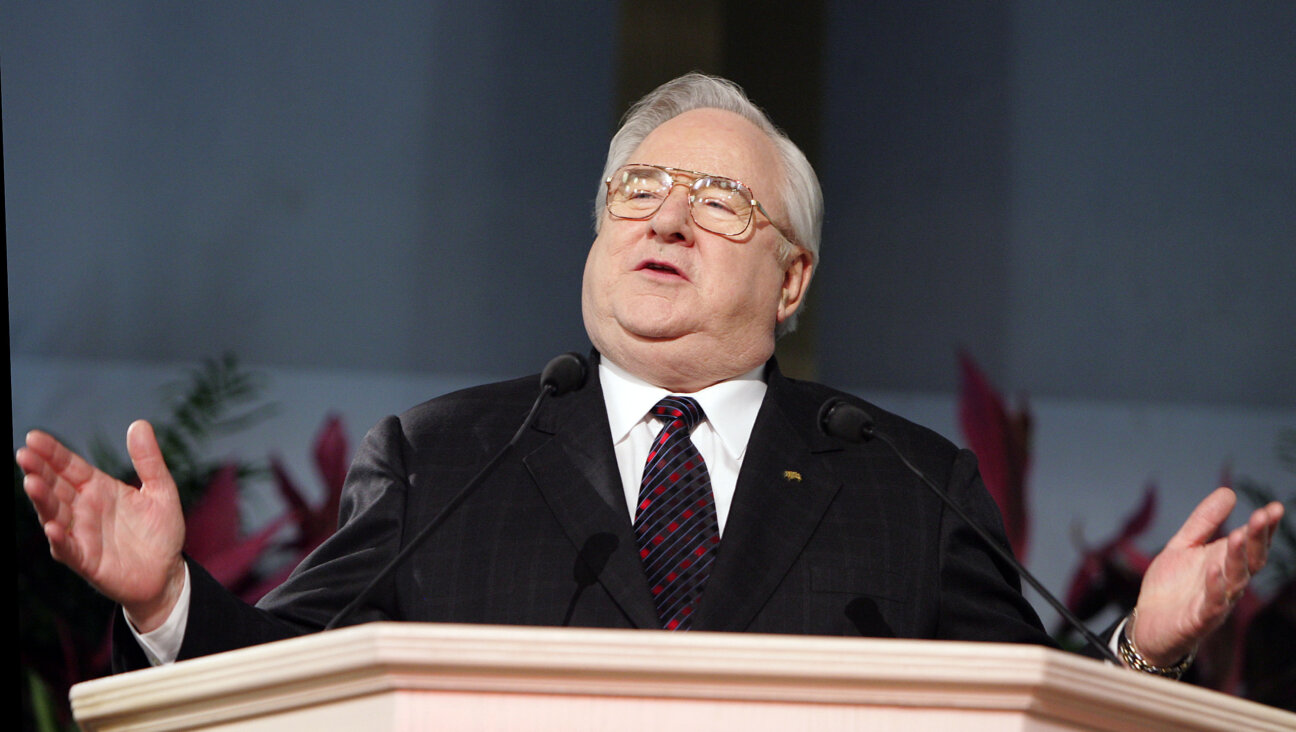Bruce Springsteen’s Jewish Neighbors — and Other Highlights of The Boss’s Autobiography

Bruce Springsteen Image by Getty Images
The first time Jews Bruce Springsteen mentions Jews in his impressionistic new autobiography “Born to Run,” he’s talking about the family who occupied the other half of a duplex his family moved into in 1966.
More specifically, and perhaps not surprisingly, it has to do with the family’s two teenage daughters.
“In the half we didn’t occupy lived a Jewish family,” writes the Boss. “My mom and dad, no racists or anti-Semites, still felt the need to caution my sister and me that these were the folks who … DID NOT BELIEVE IN JESUS! Any theological issues were immediately forgotten when I saw two gorgeous daughters, my new next-door neighbors, who carried with them a fabulous voluptuousness, full mouths, smooth dark sin and weighted breasts – oy!”
While the image of a teenage Bruce Springsteen lusting after two Jewish sisters approximately his age as if they were something alien or exotic may strike some as funny or others as offensive, it’s the “oy!” with which he punctuates the memory that takes it out of the realm of cliché and makes it quintessentially Springsteen, capturing the raconteur’s self-deprecating sense of humor.
He continues, “I immediately began imagining warm nights on the front porch, their tan legs pouring out of summer shorts, as we debated the Jesus question. Personally, I would’ve quickly thrown over our savior of two thousand years for one kiss, one run of an index finger over the coffee-colored ankle of either of my new neighbors.”
Do a little editing to these sentences and they could easily have been lyrics to a song on the album with the same title as Springsteen’s memoir.
He ends the story thusly:
“One evening when I did bring up the Jesus thing, it was like I’d said, ‘f—k.’ Sweet palms were quickly raised to rose lips, followed by red-faced girl giggling. There would be many restless teenage nights at 68 South Street.”
While Springsteen was raised solidly Roman Catholic in an extended Irish-Italian family — in spite of those early rumors that he was really Springstein and Jewish (he doesn’t address this in his book) – his story is embedded with a few Jewish nuggets.
Like a first-born Jewish boy, Springsteen writes, “due to order of birth and circumstance, I was lord, king and the messiah all rolled into one.” He would, of course, go on to be all three when he ultimately triumphed as the inheritor of Elvis Presley’s rock ‘n’ roll crown, but as a child, the utter and obsessive devotion of his grandmother toward him wound up causing much family turmoil. “My parents and I became distant relatives and my mother, in her confusion and desire to keep the peace, ceded me to my grandmother’s total dominion.”
Paying tribute to the powers of persuasion of his first real manager and producer, the Flushing, Queens-born Mike Appel, Springsteen writes, “Mike could’ve talked Jesus down from the cross…” It was the part-Jewish Appel who was responsible for bringing Springsteen to the attention of patrician talent scout John Hammond, who upon hearing him immediately insisted that Clive Davis — a nice Jewish lawyer who was raised in Crown Heights, Brooklyn, and who was then head of Columbia Records — sign him. Which he did.
At the time, the early 1970s, Springsteen was living hand to mouth. He got by via sponging off friends, girlfriends, “a few bucks from Mike,” and, he writes, from “a gal lightly on the side who owned her own business and drove a fancy sports car. She was fabulously Jewish, a little older than me, and would occasionally sweep me up of the corner of Cookman Avenue to spend a night in her condo apartment high overlooking he beaches of Asbury Park…. The periodic evenings in her solidly middle-class digs took the chill out of street-level living in Asbury, and were comforting and most welcome.”
Springsteen recounts making his first records for Columbia with Appel producing and with Appel’s friend, Louis Lahav, a former Israeli paratrooper, engineering. It was an arrangement that lasted from “Greetings from Asbury Park” to “The Wild, the Innocent, and the E Street Shuffle” to the title track to Springsteen’s third album, which shares the title of his memoir. After laying down the song that would become most identified with Springsteen, the Boss gave Appel — and therefore Lahav — the boot, after which soon-to-be-manager Jon Landau, a rock critic and graduate of Brandeis University, took the helm as producer (and brought in a little known at the time Italian-American engineer, Jimmy Iovine, to man the boards).
(Curiously, no mention is made of Lahav’s wife, Suki Lahav, who briefly held the position of violinist and backup violinist with the E Street Band, and who recorded the famous violin intro to “Jungleland” on “Born to Run.” She is also often mentioned as having had a romantic dalliance with her Boss.)
Landau become more than just Springsteen’s manager and producer. He was Springsteen’s first real sounding board, someone with whom he could discuss and clarify his theories about music and life, his first real intellectual interlocutor: “Jon Landau was the first person I met who had a language for discussing these ideas and the life of the mind.” Springsteen also writes that in significant ways, Landau, just two years older than the Boss, has been a lifelong father figure to him.
Landau was also the first person to open the door into the world of psychotherapy for Springsteen, who reveals in his memoir his lifelong struggle with depression. “Prior to Jon, I knew no one who’d spent three minutes in an analyst’s office. I grew up around a lot of very ill people, secretive, susceptive to serious depression, and disturbing, unpredictable behavior. I knew it was a significant piece of my own mental makeup.”
Over the course of his memoir, Springsteen pays tribute to many of his influences, but two stand out above all, and it’s easy to see why, as Springsteen probably came the closest to combining the artistic achievements of these two, who never had a chance to work together themselves. I speak of course of perhaps the all-time greatest record producer, the Bronx-born Phil Spector, and Bob Dylan, whom Springsteen calls “the father of my country.” In no small way, Springsteen is the bastard child of Spector and Dylan.
All of his time spent with these Jewish friends, girlfriends and business associates seems to have rubbed off on Springsteen, who is quick and easy with a Jewish analogy. One night at a New Jersey nightclub, a former high school crush, newly divorced, is telling him all about her troubles. “Though I truly couldn’t have cared less, I was listening like the secrets of the Dead Sea scrolls were being revealed to me. All I was hearing was her hair, her eyes, her lips, her T-shirt….”
And bragging about how he raised his children to be clueless about their famous dad, he writes, “When our kids were young, we never pushed our music at home…. My kids didn’t know ‘Badlands’ from matzoh ball soup.”
When success finally comes and he’s king of the world, top of the heap, Springsteen and his wife, singer Patti Scialfa, finally meet that other king of New Jersey, at a “Hollywood ‘Guinea Party’,” hosted by Tita Cahn, wife of Jewish songwriter Sammy Cahn. He subsequently befriends Frank, and winds up attending a quiet 80th birthday dinner chez Sinatra, sitting around the living room piano along with Steve and Eydie Gorme and Bob Dylan.
But perhaps the most Jewish moment in his book comes in the final chapter, “Long Time Comin’,” when he writes, “I work to be an ancestor.” Now there’s a manifesto with a strong Jewish accent.
Seth Rogovoy is a contributing editor to the Forward and the author of “Bob Dylan: Prophet Mystic Poet” (Scribner, 2009).






















